On October 19, 2024, a German neo-Nazi party hosted a lecture featuring Abdallah Melaouhi, the former caregiver of Rudolf Hess. Melaouhi frequently lectures in nationalist circles, recollecting and sharing personal experiences from his time with Hess, highlighting their close relationship and portraying Hess as a loyal, intellectually engaging figure. He also reiterates his belief that Hess did not commit suicide in 1987, but was murdered, contrary to official accounts. (Hess was found dead on August 17, 1987, at age 93, in prison; he had hanged himself using an extension cord strung over a window latch. A note to his family was found in his pocket, thanking them for all they had done.) Melaouhi alleges Hess was silenced because he revealed sensitive information he had disseminated to the public upon his release from prison. Melaouhi's accounts have gained prominence in nationalist circles, where the revision and romanticizing of the legacy of Rudolf Hess and the Third Reich, are popular.
YOU MUST BE SUBSCRIBED TO THE MEMRI DOMESTIC TERRORISM THREAT MONITOR (DTTM) TO READ THE FULL REPORT. GOVERNMENT AND MEDIA CAN REQUEST A COPY BY WRITING TO DTTMSUBS@MEMRI.ORG WITH THE REPORT TITLE IN THE SUBJECT LINE. PLEASE INCLUDE FULL ORGANIZATIONAL DETAILS AND AN OFFICIAL EMAIL ADDRESS IN YOUR REQUEST. NOTE: WE ARE ABLE TO PROVIDE A COPY ONLY TO MEMBERS OF GOVERNMENT, LAW ENFORCEMENT, MEDIA, AND ACADEMIA, AND TO SUBSCRIBERS; IF YOU DO NOT MEET THESE CRITERIA PLEASE DO NOT REQUEST.
Abdallah Melaouhi's Personal Bond With Rudolf Hess Contributes To The Rehabilitation Of The Third Reich In Nationalist Circles
In October of 2024, a neo-Nazi party held a lecture titled, "The Caregiver of Rudolf Hess: 'I saw his murderers in the eyes – Abdallah Melaouhi reports on his time with Rudolf Hess and his sacrificial commitment to justice.'" The lecture, which was not the first time the party had hosted a lecture on this topic, was moderated by a regional party chairman at the party’s flagship office and community center. The event was organized by the party's literary branch.
Abdallah Melaouhi is a Tunisian who immigrated to Germany in 1966. Between 1982 and 1987, he served the former Reich Minister Hess – Adolf Hitler's deputy - as a caregiver. The two developed a close relationship, grounded on the trust between the two men, and shared many personal experiences together.

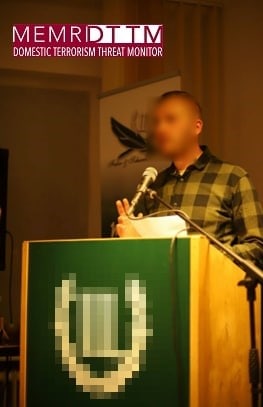
The now 82-year-old became Hess's caregiver during the last five years of his 46-year imprisonment at the Berlin-Spandau prison in West Berlin. A bond developed between the two, in part due to Hess's ability to speak Arabic fluently. This enabled both men to speak without interruption or interlocutor, and to converse privately with one another in the cell block, which was bugged with surveillance devices. The caretaker describes Hess as intellectually engaging. He states that he became a confidant to Hess, because, according to the caretaker, Hess desired to reveal secrets and aspirations which would have otherwise been hidden. The former caregiver has repeatedly alleged himself to be in possession of documents supporting Hess's intent to disclose sensitive information.
In his 2008 book, Melaouhi recollects that Hess understood his life was at risk because of a request to release him from prison. This request was submitted to Mikhail Gorbachev, the former leader of the Soviet Union. Gorbachev, according to the caretaker, had expressed willingness to support the release of Hess from prison. According to his personal accounts, the caretaker himself informed his patient of Gorbachev's inclination to release him. However, Hess expressed concern that the British could not allow him to reveal classified information to the public, which Hess intended to do if he were released. Despite being plagued by illnesses, it is said that the then 93-year-old Hess was mentally sound and articulate until his death.
Challenging The Official Narrative Of Rudolf Hess's Suicide
Melaouhi has consistently asserted that Hess did not die by suicide, but was rather the victim of an orchestrated murder, arranged to silence him. This assertion is based on the caretaker’s own experience, the post-mortem and physical evidence, as well as the overall circumstances in which the official finding of the death was announced. A follow-up autopsy was conducted on behalf of Hess's son. This second autopsy supposedly identified strangulation marks – rather abnormal for a suicide by hanging, as had been originally announced. Furthermore, he speculates that essential neck organs, including the trachea, carotid artery, and larynx, as well as the thyroid, were missing from his body following the initial autopsy conducted by British authorities.
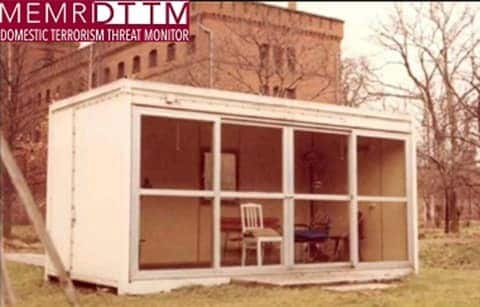
The garden shed on the grounds of the Spandau Prison, where Rudolf Hess was found dead.
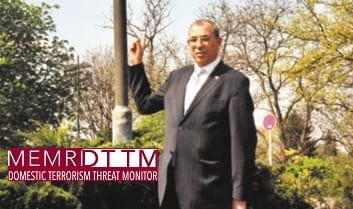
This assertion pairs with his allegation that Hess had expressed concern for his safety, including fears of assassination. He emphasizes the absence of circumstantial evidence surrounding the inquest; it has been allegedly not disclosed what he has reported following his arrival at the scene several minutes after.
Use Of Melaouhi's Accounts To Bolster Conspiracy Theories
Abdallah Melaouhi, who still resides in Germany, has delivered numerous lectures on his experiences with the former Reich's minister Rudolf Hess during the very last years of his life, sharing anecdotes as well as detailed accounts on how they shared information, covertly, bypassing the prison's security apparatus. For decades, he has been committed to refuting the official account of the suicide by hanging, based on his caring for an intelligent man, and a belief that Hess was barred by the British Secret Service from exposing peace offers proposed by the Third Reich to Winston Churchill.
Melaouhi is a frequent guest in German neo-Nazi circles. Many recognize him as the last and chief witness supporting a widely held conspiracy theory that Hess was assassinated by the Allies, specifically by the British secret service, and in contrast to official accounts, did not take his own life. His recollection, coupled with his implicit pledge to carry on the legacy of Rudolf Hess and his commitment to the "historical truth," has become a widely acknowledged source of authority among historic revisionists. His account simultaneously validates a romanticized German past and legitimizes, and at times glorifies, the Third Reich.
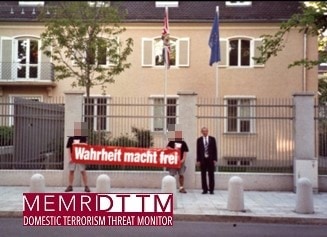
Revising History In Nationalist Circles
Under the pretense of what he calls the "struggle for the truth," the caretaker attended numerous events organized by German neo-Nazi organizations. He spoke most often at the invitation of the "Die Heimat," party, formerly known as the National Democratic Party, and a prominent neo-Nazi party.
In an interview with a nationalist blogger, Melaouhi sought to humanize Hess, and to convey the world view of Hess as Melaouhi had known him in the five years he cared for him: Hess believed in the influence of astrology and eco-healing; he spoke of atomic energy, as well as hydroelectric power and its benefits to the environment. Hess is said to have loved tennis, water sports and skiing. In none of his accounts did the caretaker acknowledge the crimes of Rudolf Hess prior his 40-year imprisonment. Rather, he attempted to revise the perception of Hess, portraying him as a person of integrity, as a role model for nationalists, and as a martyr for the cause.
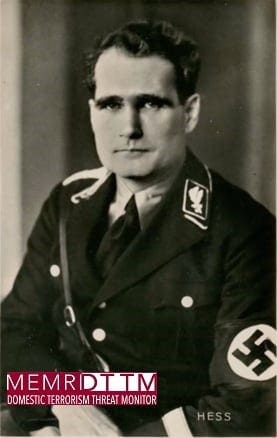
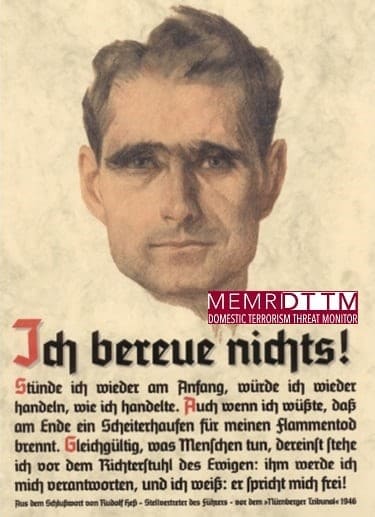
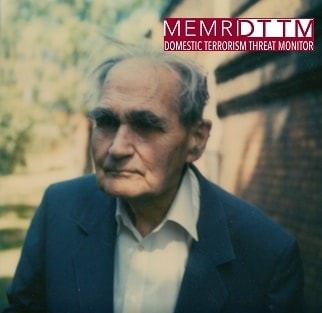
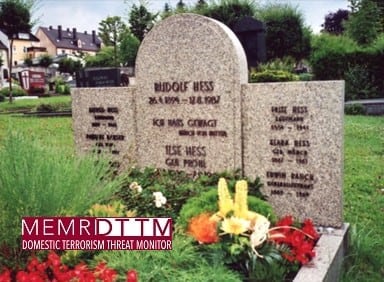
The full text of this post is available to DTTM subscribers.
If you are a subscriber, log in here to read this report.
For information on the required credentials to access this material, visit the DTTM subscription page




